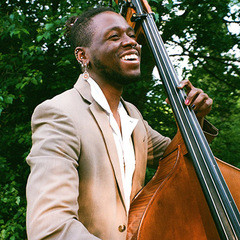|
Back
Eine Kleine Mattinee-Musik New York
Kaufman Music Center
01/17/2023 -
Johann Sebastian Bach: Cello Suite No. 4 in E‑Flat Major, BWV 1010
Traditional: Selections from Five Negro Spirituals
Wolfgang Amadeus Mozart: Serenade No. 13 in G Major “Eine kleine Nachtmusik”, K. 525
John Hedges: Raise Hymn and Praise Shout
Kebra-Seyoun Charles: Dance Suite
Kebra-Seyoun Charles (Solo Double Bass), Juliette Greer, Tara Pagano‑Toub, Sommer Altier (Violins), Kayla Williams (Viola), Aaron Wolff (Cello), Maggie Cox (Double Bass), Ryan Jung (Piano)

C. Kebra-Seyoun (© Courtesy of the artist)
What is so rare as a solo double-bass recital? The last I heard was Gary Karr in Hong Kong many decades ago. He was brilliant on his instrument, equally raconteur, artist and comic. Like Mr Karr, Kebra‑Seyoun Charles yesterday was deft with his chosen instrument. And like Gary Karr, he comes from generations of musicians. (Russia? Africa? It’s all music.) Unlike the Canadian, Kebra‑Seyoun Charles didn’t have anecdotal schtick. This was a most serious recital, and in effect, a buffet of different ensembles and styles. Kebra‑Seyoun Charles, in a dazzling red shirt, shared his expertise and enjoyment with six other string players and a pianist, and all seemed to bring a jauntiness to the proceedings.
The concert started with Kebra‑Seyoun Charles playing a Bach Cello Suite, dances and soliloquies. Was his articulation perfect? Perhaps not always, or perhaps I was more accustomed to the purity of the cello. On the upper registers, Kebra‑Seyoun Charles had a clear sense of line, and an impressive palette of colors. The Allemande and final jigs moved with balletic grace. Not too much rubato, no ornaments, not too wide but abundant vibrato.
Lawrence Brown’s Five Negro Spirituals had been arranged in the 1920’s by a supposedly dazzling pianist (here Ryan Jung did the honors), and from the start, I felt it was less a string bass and more a vocal bass. Yes, Paul Robeson had recorded it. Yet Kebra‑Seyoun Charles gave it more than a double bass song. These were lush melodies. Not sentimental, some close to Foster minstrel music. Yet when it came to the centerpiece, Sometimes I Feel Like a Motherless Child, Kebra‑Seyoun Charles performed a miracle.
It started with the song itself, a bit doleful but oh so melodic. That’s when, the double bassist went off on his own, a cadenza part bluesy, part seemingly a double bass riff, always retaining the original song. A most un‑bathetic Sweet Chariot to end the work.
Next was the full Eine kleine, and I really truly expected the soloist to take over the First Violin part. But no, Kebra‑Seyoun Charles stayed with the chamber ensemble, his notes those of the cellist.
Composer John Hedges is a new name, and his Raise Hynm and Praise Shout came close to being a Concerto for Double Bass and String Quintet, for Kebra‑Seyoun Charles was non‑stop soloist. Mr Hedges was obviously inspired by the Black Church, yet the opening What A Friend We Have in Jesus, was concealed, the music peeping out of a string forest until soloist and strings executed it in amorphous lines. The second connected session belonged to Kebra‑Seyoun Charles (was the ensemble humming?), and the end was a “praise shout”, with the whole group shyly stamping.
Kebra‑Seyoun Charles’ Dance Suite was an enigma: tuneful, bouncy, but short, as if I was a single movement of a longer work.
The result? One wasn’t left with echoes of a young master of double bass, so much as a variegated concert of Baroque, classical, folk and modern, a rare combination by a frequently rare artist.
Harry Rolnick
|